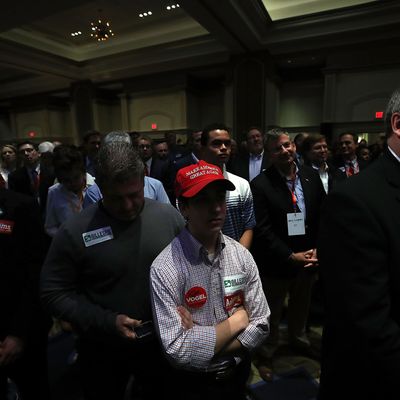
Election losses are traumatic and reckonings are uncomfortable. Confronting yesterday’s election results in Virginia and elsewhere would force many Republican pols and conservative media to wrestle with the fact that Trump’s coalition did not appear to hold together. So it’s not surprising that they have mostly chosen to ignore it. Fox News carried the avoidance a bit far, providing very little coverage of the Virginia gubernatorial election last night or this morning, either:
At Breitbart News, whose writers and editors are a bit more willing to admit the possibility that the GOP is not a big happy family rolling from victory to victory, there is also a lot of 2016 retrospective celebration going on today commemorating the first anniversary of Trump’s election as president. But there’s some coverage of Election Day 2017, and it predictably echoes the president’s own dismissive tweet from last night:
One Breitbart piece referred to Gillespie as “Swamp Creature” and suggested the great Trumpian prophet (and Breitbart News chairman) Steve Bannon had privately predicted it:
Even as Bannon publicly voiced support for Gillespie and the Republican ticket, he privately complained about Gillespie’s unwillingness to go “full Trump,” and to actively embrace the president and “economic nationalism.” That, as Bannon and his allies would tell it, is when and how Gillespie lost it.
This revisionist take was probably necessary to erase the bad odor of a Bannon statement to the New York Times just a few days ago:
“He’s closed an enthusiasm gap by rallying around the Trump agenda,” said Stephen K. Bannon, the president’s former strategist. “And I think the big lesson for Tuesday is that, in Gillespie’s case, Trumpism without Trump can show the way forward. If that’s the case, Democrats better be very, very worried.”
The candidate who ran a Trumpism with Trump campaign, Gillespie primary rival Corey Stewart, who had previously claimed to have been vindicated by the way Gillespie was copying his strategy, revoked that tacit endorsement:
Stewart also vowed not to in any way distance himself from Trump in his pending 2018 campaign against Senator Tim Kaine, who has won exactly three times more statewide campaigns in Virginia than has Stewart.
The most obvious problem with this analysis is that the parts of Virginia that would presumably be most sensitive to a Republican candidate’s fidelity to Donald Trump — the areas he won in 2016 — voted for Gillespie just as strongly. As veteran Virginia observer Larry Sabato noted:
Gillespie did about as well as Trump in percentage terms in rural Virginia – he kept the Trump vote. He actually got 170,000 more votes than the last Republican candidate for governor.
It seems more than a little implausible that Gillespie was able to win Trump Country solidly but lost because Trump fans in blue parts of the state stayed home out of dismay at their candidate’s refusal to put on a MAGA cap and proclaim his undying love for POTUS.
The obvious explanation that Trump supporters don’t want to hear is that it was precisely Gillespie’s affinity for the Trump message and agenda that doomed him — and worse yet, the Virginia state GOP — to a disastrous performance in Virginia’s urban and suburban areas. That a Democratic tide appeared in a number of other states yesterday is an indication that Trump is a problem, not a solution, for his party.
Beyond the bruised feelings of true believers in the president’s message, the failure of Trumpism without Trump in an actual election is terrible news for Republicans hoping that Gillespie had found a way to keep their party united. A poll analysis from the Washington Post just a week before the election suggested that Gillespie had “successfully threaded the needle” by appealing to Trump’s white working-class base with harsh culture-war themes without alienating college-educated suburbanites interested in his tax-cut plans. Had he won or come very close, it might have reinforced the wisdom of the much broader GOP strategy of keeping its white working-class voters entertained with culture-war bread and circuses while rewarding traditional Republican constituencies with tax cuts, deregulation, and when possible, attacks on Big Government. Whether this strategy is an accommodation to Trumpism or the essence of Trumpism itself, had it succeeded, it certainly would have been a formula for peace in the GOP.
One notable dissenter from the emerging party line that Gillespie had not been Trumpish enough was RNC chair Ronna Romney McDaniel, who rejected the notion entirely:
“Ed [Gillespie] did work with the president,” Romney McDaniel said during a Fox News interview. “I absolutely think any candidate should be embracing the president … and I think Ed did.”
Republicans who don’t simply want to double down on MAGA must reorient themselves and choose a strategy going forward. They could just rationalize the Virginia defeat as happening on difficult terrain; the state did vote for Obama twice and HRC just last year, and as Virginia’s own maximum Trump supporter Jerry Falwell Jr. pointed out, all those public-sector employees in Northern Virginia really belong to D.C. culturally, not to the Old Dominion. It’s also possible that in a state with more white working-class voters and fewer college-educated suburbanites, a candidate like Gillespie — or someone with a harder edge like another Trumpism-without-Trump exemplar, Tom Cotton — could still “thread the needle.”
But it’s no longer looking easy, and yesterday’s results greatly increase the temptation for the Breitbart wing of the GOP to limit cooperation with “Swamp Things” in Washington, even on items of common interest like cutting taxes. It’s unlikely that loyally emulating or strictly avoiding the president’s cruder habits and prejudices will solve the GOP’s political problems, absent a real reckoning with how Republicans feel about things like white racial dog whistles, authoritarianism, economic inequality, and corporate power. Those issues will be around long after the 45th president is gone.
One thing is very clear: Ed Gillespie tried to be all Republicans to all people, and it didn’t work.






























